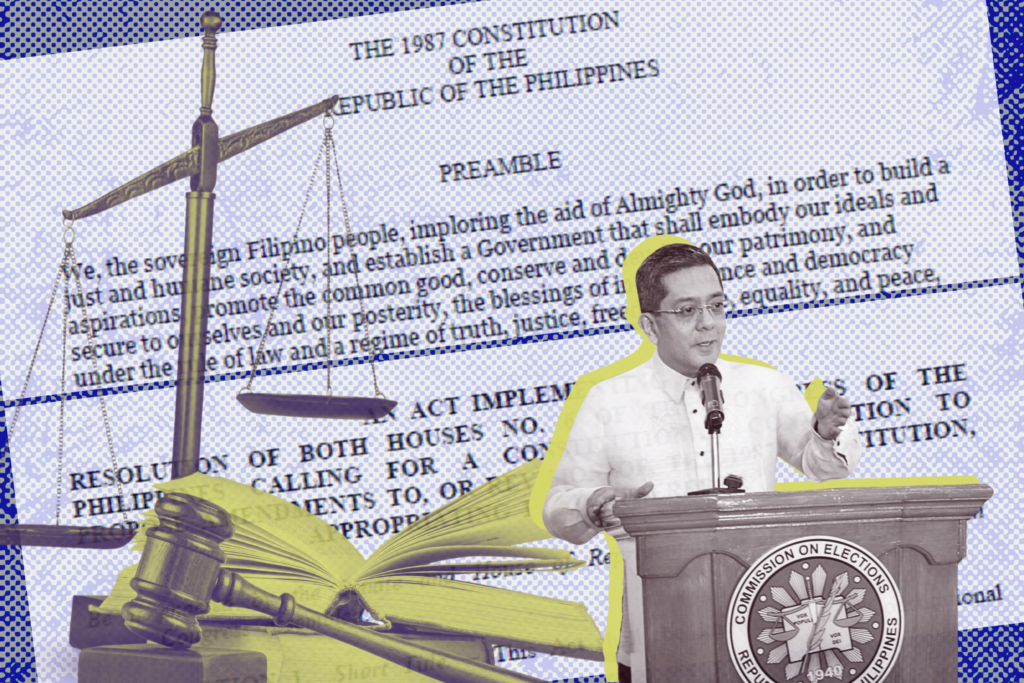Cha-cha plebiscite and midterm polls in one event: A test of Comelec’s independence

BOTH LEGISLATIVE chambers are now leading charter change discussions. Legislators have repeatedly said that amendments will be limited to economic measures in the 1987 Constitution.
Meanwhile, the conduct of the plebiscite had Commission on Elections (Comelec) Chair George Garcia describe the logistical preparations required for it. He argued that it should be held as a separate event from the 2025 midterm elections. He has since change this stand, and said holding the elections and the plebiscite will save costs. Only a few reports pointed to Garcia’s change of mind.
Garcia’s backpedaling
The idea of a plebiscite was first floated by proponents of the people’s initiative (PI) for charter change in January. During the first Senate hearing on PI last January 30, Senator Risa Hontiveros asked Garcia about how much it would take to hold a plebiscite.
Only the Daily Tribune and GMA News Online reported Garcia’s answer. Tribune cited Garcia’s point that there is no budget allocation for a plebiscite in 2024; and that the cost would be a minimum of PHP23 billion, so holding it anytime soon would be imprudent.
GMA carried Garcia’s statement about other logisitcs require by the plebiscite, preparations which would take months while Comelec undertakes the 2025 midterm elections.
On February 5, The Philippine Star, Inquirer.net and GMA News Online reported that in a radio interview, Senator Sonny Angara suggested holding the cha-cha plebiscite simultaneously with the 2025 elections to save money.
Garcia disagreed. In an ANC interview with Karen Davila on February 7, Garcia revealed a legal hurdle to holding the two events as one. He cited the Supreme Court (SC) ruling in the case of Occena v. Comelec, saying, “You cannot include a plebiscite for the amendment of the constitution in a regular election.” He reasoned further that voters need to have a “clear mind” in deciding matters as important as amending the charter or electing officials, hence the two activities should not be done in one sitting.
Senate President Juan Miguel Zubiri on February 26 told Senate reporters that the two should done at the same time, saying that he had discussed this with President Marcos in a closed door meeting. Two days later, news quoted the president acknowledging the cost of two events and saying “It really comes down to a practical thing, because a plebiscite is also an election.”
On February 27, ABS-CBN News, GMA News Online, Frontline Pilipinas, Inquirer.net, and the Manila Bulletin reported Garcia’s revised view. In an interview with the press, Garcia expressed agreement with suggestions to hold the plebiscite simultaneously with the midterm polls, as this would mean lower costs. Reporters did not ask about the legal question which he himself had previously pointed out to argue against holding the two events simultaneously. These accounts noted that Garcia changed his position after Zubiri and the president agreed about the cost-saving advantage.
In reporting Garcia’s changed position, only Rappler and Philstar.com, in reporting Garcia’s changed position, recalled his initial stand. Philstar.com highlighted Garcia’s “change of tune.” Both accounts referred to Garcia’s reference to the SC ruling, but did not ask how Comelec could overcome the legal prohibition.
On February 28, The Philippine Star and The Manila Times reported the reason Comelec gave for the backtracking: the SC ruling did not specifically prohibit synchronizing the two events; hence the absence of a legal impediment.
Election lawyer’s opinion
Reports on March 4 in the Inquirer.net, The Philippine Star, Manila Bulletin, The Manila Times, and One News carried the statement of election lawyer Romulo Macalintal arguing in support of Garcia’s initial position. BusinessMirror also published Macalintal’s position as an opinion piece.
Macalintal said that under Article XVII, Section 4 of the 1987 Constitution, ratifying any amendment to the charter “shall be by a majority of the votes cast in a plebiscite.” He noted that from the original wording in the 1935 charter, the current constitution specified the activity as a “plebiscite” to the 1967 consolidated cases of Gonzales v. Comelec and Philconsa v. Comelec.
Macalintal added that SC justices in 1935 had decided on a similar case, citing their opinion: “In deciding amendatory proposals (to the charter), the people must be free from consideration of extraneous matters, such as the choice of (elective) national and local officials.” Thus, Macalintal said that Garcia’s first position was a correct reading of the constitution.
Media should seek more expert views in their follow-up reports.
Missing context
Coverage should have focused on the timing of Garcia’s change of view. Journalists should have called attention to the fact that Garcia revised his stand after Zubiri talked favorably about saving costs by holding the two votes together followed by the president’s concurrence.
Media should have noted Garcia’s quick alignment of his views with the administration. Reporting on the flip-flop, media did discuss the change as an indication of Comelec’s lack of independence.
Comelec must function as an autonomous agency, above the influence of any partisan group, particularly incumbent officials. Otherwise, how can people trust the agency to hold and supervise free and fair elections, and just as important, plebiscites?
Journalists should always be conscious of context. George Garcia was appointed by Rodrigo Duterte when the Dutertes and the Marcoses were unquestioned allies. Garcia was the lawyer who represented Marcos’ protest against Leni Robredo’s election as vice president in 2016.
Garcia could have demonstrated a measure of independence by holding on to his initial position. But unfortunately he did not. Media should keep this context in mind in 2025 and 2028.
Leave a Reply